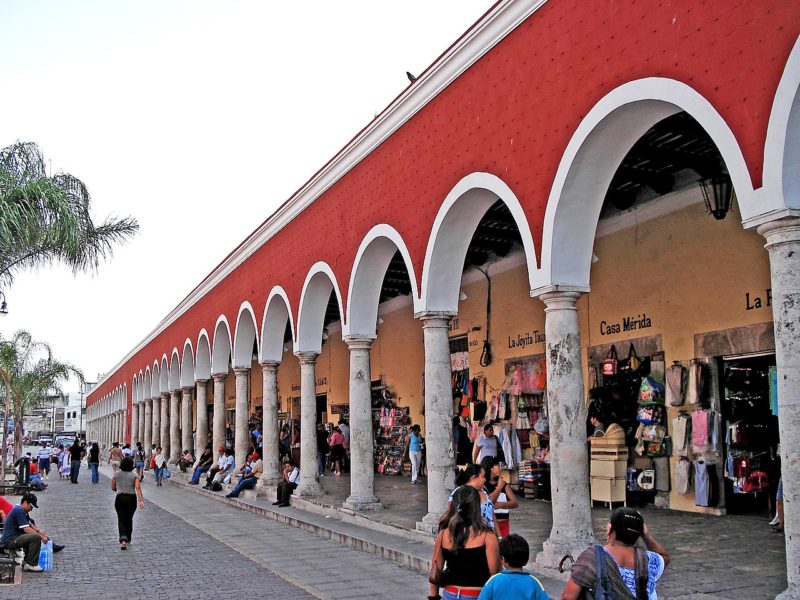Guest post by Shannan Mattiace and Sandra Ley
Over the last several months, violence in the Riviera Maya region of Quintana Roo, a favored destination for domestic and international tourism, has escalated notably. In February 2022, for example, a firefight between rival cartel members left two dead in one of Tulum’s most elegant restaurants. In the neighboring state of Yucatán, however, things are—and have been—very different. The international and national press routinely publish articles about Yucatán as a safe destination. In 2019, CEOWORLD Magazine ranked Mérida, the capital of Yucatán, as the second safest city in North America and the safest city in Latin America.
For decades, despite rising criminal violence across Mexico and an ongoing War on Drugs, the state of Yucatán has registered a very low homicide rate of 2.5 per 100,000 people (akin to Connecticut), compared to the Mexican national average of 29 per 100,000. That’s not to say that violence doesn’t occur at all. Both police and gender violence have risen in the past few years, and there have been instances of unsettling narco-related violence. The most serious incident occurred in August 2008 when 11 decapitated corpses draped with narco messages were found on the outskirts of Mérida. High-ranking leaders of several OCGs have been arrested in Mérida in recent years, and Lantia Intelligence, a security consulting agency, documented the presence of the Sinaloa Cartel, the Jalisco New Generation Cartel, and the Gulf Cartel in Yucatán state between 2019–20.
On the whole, though, and despite the criminal presence, levels of violence are low in Yucatán. What explains the historically low homicide rate in Yucatán state even as neighboring states have exhibited much more visible violence?
There are some straightforward explanations for Yucatán’s low homicide rate. One is its geography: Yucatán does not have direct access to the rest of Mexican territory or to Central America and has relatively few lootable resources (e.g., mining; forests; fertile land for cultivation) that make the state less lucrative for organized crime groups (OCGs). However, neighboring Quintana Roo and Campeche also have few lootable resources and have experienced comparatively higher levels of criminal violence and organized crime presence.
Another possible explanation for Yucatán’s low homicide rate is the strength of its policing institutions. However, according to the World Justice Project, the level of training among Yucatán’s state police forces is below the national average and state public security ministry budgets are comparable to those of neighboring states.
In our research, we found that the most persuasive explanation for the containment of violence in Yucatán has to do with coordination between federal and state elected officials, as well as among state security agencies. Since Mexico transitioned to electoral democracy in 2000, it has not been uncommon to have different parties in power at the gubernatorial and the federal level. This can make coordination and collaboration between government officials difficult, especially when dealing with serious issues like security and organized crime. For example, researchers have noted the dearth of federal-state coordination between President Calderón, who served from 2006–12, and left-leaning governors, from Partido de la Revolución Democrática (PRD).
In Yucatán, however, there has been effective coordination between parties. During Calderón’s time in office, Yucatán was governed by the PRI (Partido Revolucionario Institucional) party, a rival to Calderón’s party, PAN (Partido Acción Nacional). However, Calderón and Yucatán’s PRI governor worked well together and developed a joint approach to confront the 2008 massacre. There was also extensive coordination among state security agencies under the leadership of Luis Saidén, who has been at the helm of State Public Security (SSP) almost continuously since 1995 and has served under four different gubernatorial administrations (with the notable exception of 2001–07). We contend that Saidén’s extended time in office has provided some stability to interactions among security agencies and OCGs and has therefore reduced conflict within the state and between the state and OCGs. A similar dynamic occurred in Medellín, Colombia, reinforcing a notion long described by political scientists: that long time horizons—either because of reelection opportunities or long-term stability in their positions—can result in state cohesion.
While criminal violence is not a major problem in Yucatán, two types of violence are notable in the region: police torture and violence against women. According to the World Justice Project, as of 2016, Yucatán stands among the states with medium-high levels of police torture. While in other parts of Mexico police use torture mainly to extract a confession, human rights organizations in Yucatán suggest that torture under police custody is used as a punishment for crimes committed, and not to extract confessions. Violence against women in Yucatán is also notable and increasing. According to the 2016 National Survey on the Dynamics of Household Relationships, Yucatán ranks sixth in the proportion of women reporting overall violence and seventh worst for intimate partner violence.
For years, government officials have touted Mérida as a City of Peace and Yucatán as a safe state, and this is true to a point. Longstanding public service on the part of the head of State Public Security has played a crucial role in keeping criminal violence at bay, but continuity of a public servant in the same position, across different partisan administrations, is rare. From a public policy perspective, one key lesson from the Yucatec case is the importance of collaboration across parties to more effectively manage violent events. Still, given the increase of both police and gender violence in Yucatán, it seems clear that the things that keep some kinds of violence at bay don’t help to reduce other kinds of violence. Policymakers and scholars who study violence will need to understand and address the differences.
Shannan Mattiace is Professor of Political Science and International Studies at Allegheny College in Meadville, PA. Sandra Ley is Associate Professor at the Political Studies Division at the Center for Research and Teaching in Economics (CIDE) in Mexico City.






